By Priscilla A. Greear - Florida Catholic
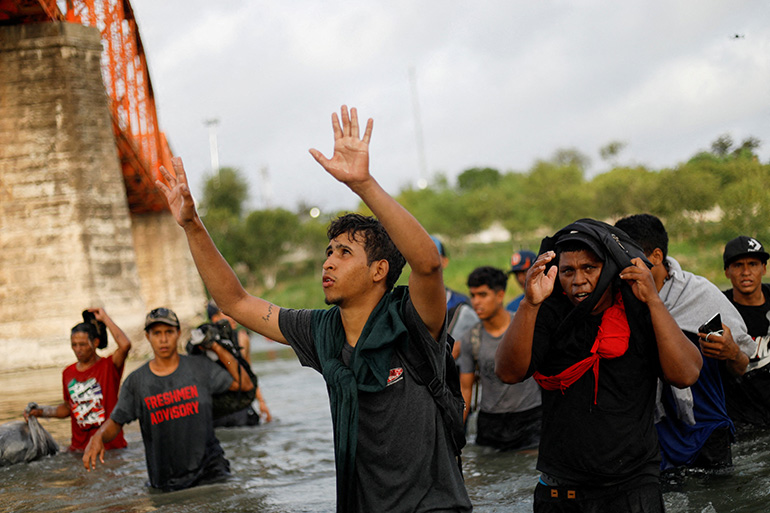
Photographer: Daniel Becerril
A Venezuelan migrant is seen from Piedras Negras, Mexico, Sept. 30, 2023, as he thanks God while walking through the Rio Grande in an attempt to cross into Texas to seek asylum in the United States. (OSV News photo/Daniel Becerril, Reuters)
MIAMI | Straddling the border between Nogales, Mexico, and Nogales, Arizona, Sister Tracey Horan works in the trinitarian trenches of pro-life, eucharistic and justice ministries: aiding desperate migrants arriving at the U.S.-Mexican frontier through the Catholic Kino Border Initiative.
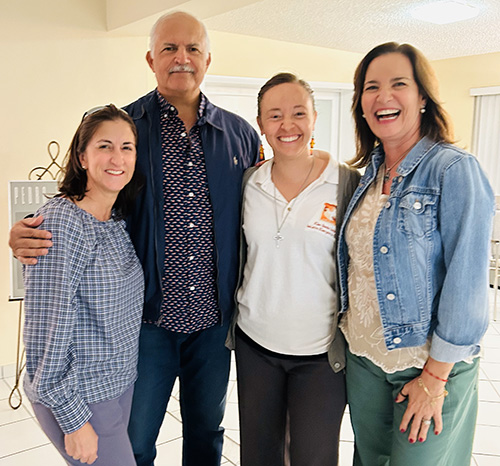
From left: Teresita Gonzalez of Belen Jesuit Prep, Julio Villafane, Providence Sister Tracey Horan, and Carmen Villafane pose after a discussion in late October of the Catholic Kino Border Initiative ministry on the Mexico Arizona border. Belen Jesuit Preparatory School of Miami is a ministry partner.
A member of the Sisters of Divine Providence, Sister Tracey is in her fifth year as associate director of education and advocacy for the Kino nonprofit. The Indiana native spoke about the Church’s charitable labors to care for the stranger during a stop at the Poveda Center of the Teresian Association. She came to Miami at the end of October to visit with some of Florida’s top immigration advocates: students at Belen Jesuit Preparatory School.
At the Poveda Center, she discussed immigration issues with archdiocesan social service leaders including retired teachers, deacons, Camillus Health Concern staff and Catholic immigration program directors. She challenged Catholics to transcend the vitriolic debate, share accurate information and analyze border policies through the Catholic lens of love, compassion and faith as International Migrants Day approaches Dec. 18.
The Mexican Missionaries of the Eucharist established the Kino Border Initiative in 2009 with border dioceses in Mexico and Arizona, Jesuit Conferences and the Jesuit Refugee Service to promote “migration with dignity.”
Kino hosts 35 to 40 groups yearly, including Belen students. The group’s focus is on humanitarian aid and accompaniment, education, and policy advocacy at their shelter and social service center.
"The Missionaries' focus on the Eucharist is such a model for us,” Sister Tracey said, describing a “big mural” of the Last Supper that features Jesus along with images of people who have volunteered and migrated.
“I think that's really symbolic of what we do when we talk about migration with dignity,” Sister Tracey said. “It's about bringing people together around a table and creating a space where we can see and encounter one another."
"We have a center where we give people humanitarian aid and it starts with food. But we also give them clothes and other services,” she added, noting that for many people on the journey “that's the first moment someone looked at them and said I care about your story. "
In the last four years, the big shifts in migration have been longer waits in Mexico and more families. About 80% of those who arrive at Kino report fleeing violence and persecution, whether from economic collapse, political oppression or cartel threats.
"Catholic social teaching is about the two feet of justice, the direct social services and balancing that with looking at the systems," Sister Tracey said.
1960 IMMIGRATION CAP
But today’s persecution often doesn't fit the categories of asylum established in 1951, of religion, race, nationality, political party and ethnicity. And annual immigration caps of one million were set in 1960, noted attorney Randy McGrorty, executive director of Catholic Legal Services. "In the meantime, our country has tripled in size and our need for immigrants has also tripled by the way. But we've kept the same cap throughout the last 60 years so there are more applications than slots."
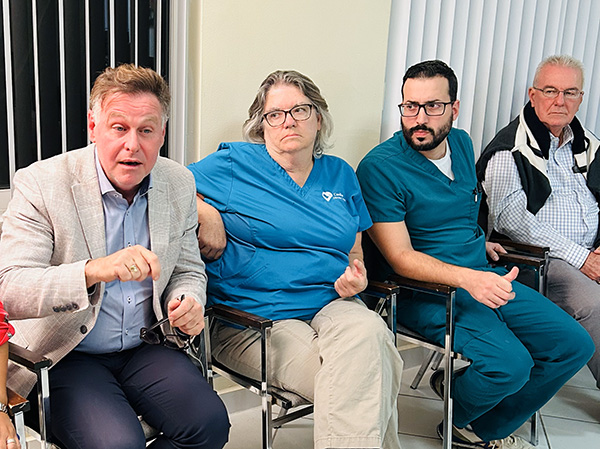
Randy McGrorty, left, executive director of Catholic Legal Services, shares asylum insights during a discussion in late October of the Catholic Kino Border Initiative ministry on the Mexico Arizona border.
The practice of turning immigrants away and decreasing ports of entry began in the Obama administration and accelerated in the Trump administration. The Biden administration collaborates more with nonprofits but maintains "an enforcement view of how to control the problem," McGrorty said. "We are a country of immigrants that has never been welcoming to immigrants."
Nevertheless, the new humanitarian parole for Cubans, Haitians, Nicaraguans and Venezuelans has been "a lifeline" particularly in Haiti, for people to apply to come for two years and escape national crisis.
McGrorty said the government needs to invest more in the CBP’s One App, which allows people to apply at the border for immigration appointments, especially when the narcotraffickers master misinformation. "We're at an inflexion point in history where the issue is how do we make it accessible so that the most marginalized can come in from the cold."
He added that people aren't trying to "jump ahead of everybody in line" but are applying through legal avenues: family, employment and humanitarian, through asylum or as refugees.
On CNN "they keep saying record number of immigrants at the border, record number of illegal entries. The numbers that we have are the numbers of interdictions so they are very high but that doesn't mean they are all being allowed in. We're not being invaded! They are waiting, they want to go to a port of entry," McGrorty said.
Kino advocates that Congress increase staff to process asylum requests.
"We've been saying we need to increase processing capacity at our points of entry because people don't want to pay a coyote $1,000 a person to get in some shady car," said Sister Tracey. "People are going through these smugglers when what they'd really like to do is to show up at a port of entry. One thing it's doing is really strengthening organized crime."
SMUGGLING CHILDREN
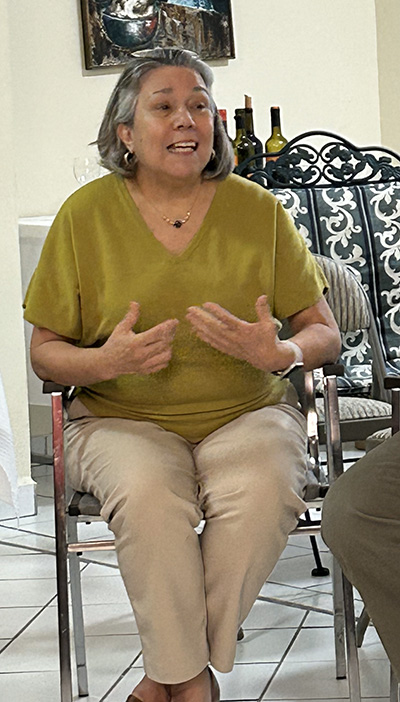
Monica Farias, left, director of Catholic Charities’ Unaccompanied Refugee Minors Program, notes an increase of younger children arriving through smugglers during a discussion in late October of the Catholic Kino Border Initiative ministry on the Mexico Arizona border.
Monica Farias, director of the Catholic Charities’ Unaccompanied Refugee Minors Program, noted an increase of younger children arriving through smugglers.
"I see more and more of this organized crime for small kids and it's heartbreaking to have a 10-year-old cross the border who speaks Creole and nobody wants him," she said. Yet in visiting churches monthly, "every time I talk about immigrant children there is always a welcome."
One of Kino's legislative priorities is HR1325, to expedite asylum work permits, which can take two years.
Teresita Gonzalez, Christian service coordinator at Belen, said her students have worked diligently on a Jesuit national advocacy campaign and met with legislators. "I was so proud of them. We were the only group in Florida," she said, adding that the Catholic voice, if it chose to focus on this issue, could make a difference “because it did on others.”
"How much more powerful could we be if we behaved like a Catholic community?" Gonzalez asked.
McGrorty praised Archbishop Thomas Wenski’s immigration leadership, from advocacy for quicker work authorization to opposition to Gov. Ron DeSantis' efforts to close shelters for unaccompanied children — an over 60-year ministry started with the Pedro Pan resettlement of 14,000 Cuban children and teens.
"If your pastor has talked about migration from the pulpit, say 'thank you so much for bringing that up' or that it's important for me in my faith to hear about the needs of today's oppressed people," added Sister Tracey.
For firsthand encounters, she invites Catholics to volunteer a month with Kino.
LOCAL ADVOCACY
Monica Lauzurique, executive director of the La Salle Educational Center in Homestead, offered ways to support local families. Services include distributing food, tutoring and helping parents acclimate.
"We have agricultural workers who can't afford to buy food," she said. "It's a different reality but they come with those scars and trauma of crossing the border, of leaving their family and land."
Deacon Juan Carlos Urquijo said "we have to help them but it's not the principal problem,” noting that immigration isn't going to end without “promoting the development, democracy, citizenship participation, liberty" in the source nations.
Carmen and Julio Villafane said they support humane immigration policy, mindful of their own families' migration from El Salvador and Cuba. Julio serves on the board of Miami's Cristo Rey High School. Carmen believes policies must respect human dignity and seeks to "be as vocal about this life issue as every other life issue."
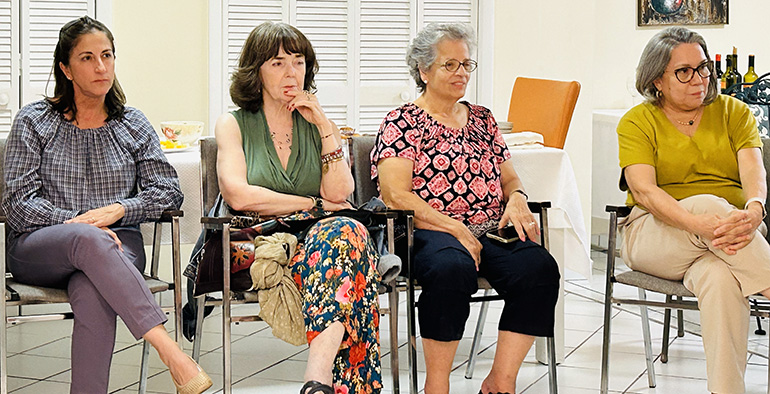
From left: Teresita González of Belen Jesuit, artist Maria Lino, Toni Miranda of the Teresian Association, and Monica Farías of Catholic Charities, listen as Providence Sister Tracey Horan, of the Catholic Kino Border Initiative on the Mexico Arizona border, discusses Catholic social teaching on immigration.

